LSBM300 Business Research: Investigating the Problems of Globalisation
VerifiedAdded on 2023/06/15
|14
|3323
|267
Project
AI Summary
This research proposal investigates the challenges that globalisation poses to businesses and the economy. It begins by defining globalisation and its impact, highlighting both the benefits and drawbacks. The proposal outlines research questions aimed at understanding the conceptual meaning of globalisation, the reasons attracting businesses to it, and the challenges it presents. A preliminary literature review examines existing perspectives on globalisation, including cultural differences, economic development, and resource utilisation. The methodology section details the quantitative approach, sampling methods (probability sampling of 40 UK entrepreneurs), data collection methods (primary and secondary), and data analysis techniques (frequency distribution analysis). Ethical considerations and potential research limitations are also addressed, with a timeline provided for project completion. This document, contributed by a student, is available on Desklib, which offers a range of study tools and resources.
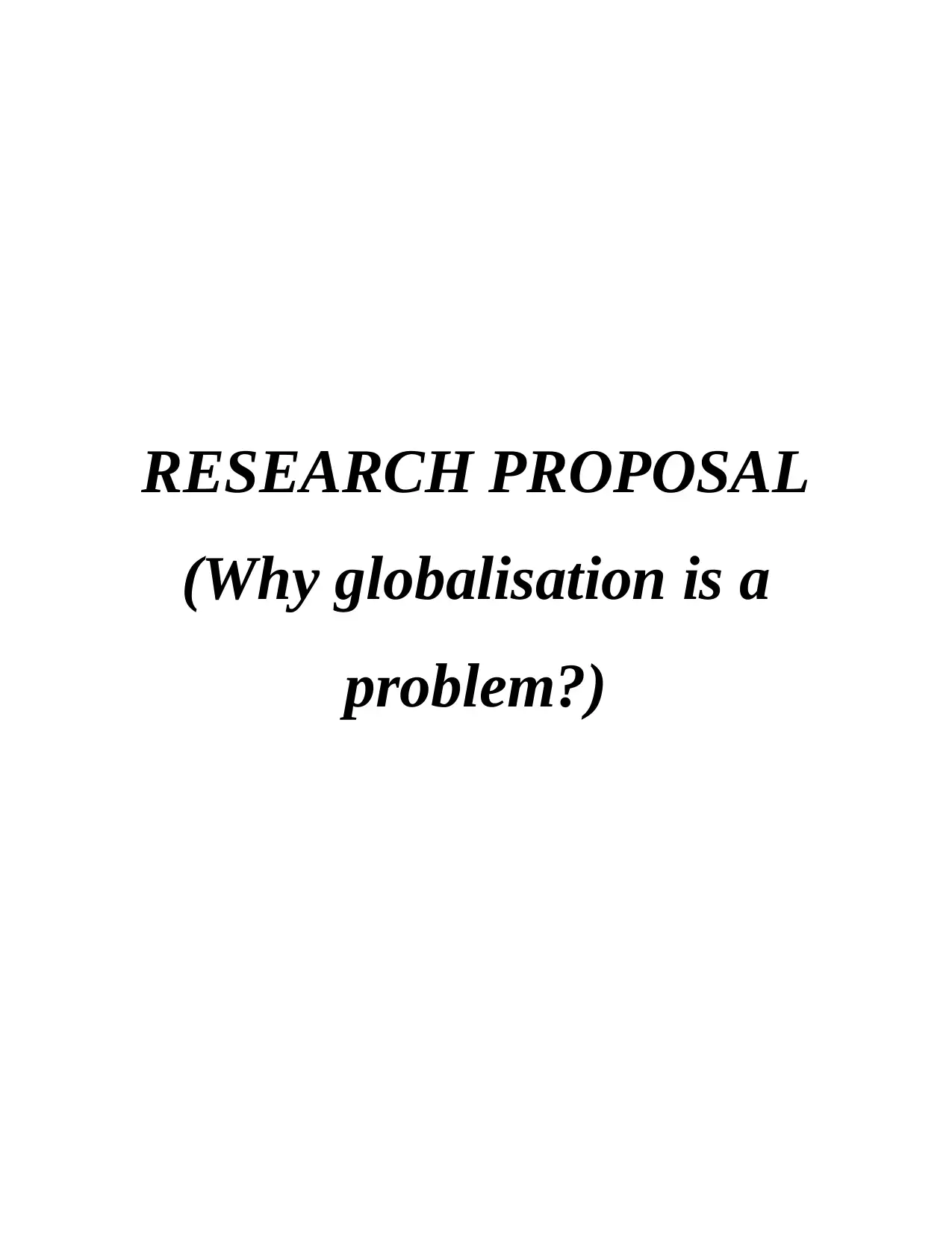
RESEARCH PROPOSAL
(Why globalisation is a
problem?)
(Why globalisation is a
problem?)
Paraphrase This Document
Need a fresh take? Get an instant paraphrase of this document with our AI Paraphraser
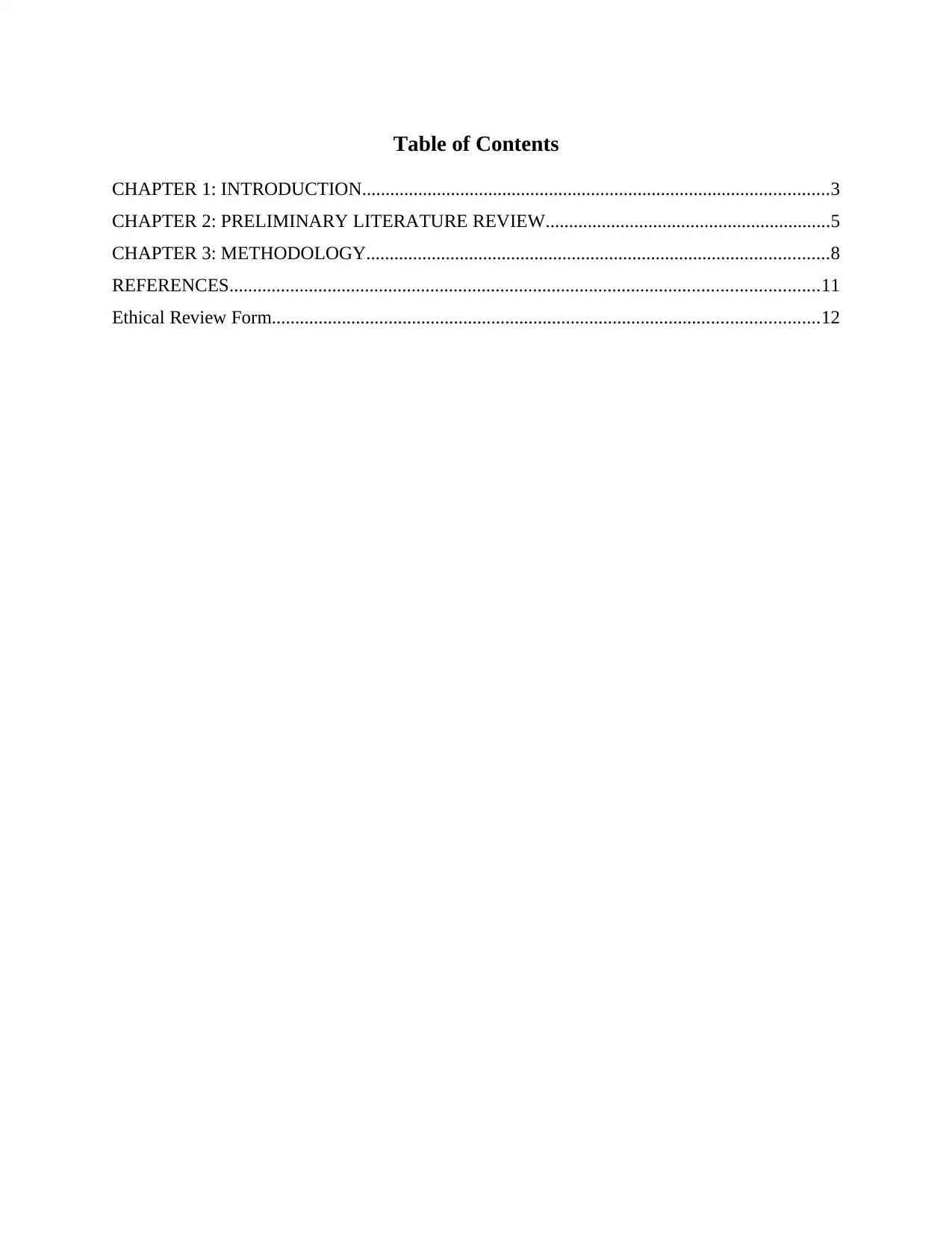
Table of Contents
CHAPTER 1: INTRODUCTION....................................................................................................3
CHAPTER 2: PRELIMINARY LITERATURE REVIEW.............................................................5
CHAPTER 3: METHODOLOGY...................................................................................................8
REFERENCES..............................................................................................................................11
Ethical Review Form.....................................................................................................................12
CHAPTER 1: INTRODUCTION....................................................................................................3
CHAPTER 2: PRELIMINARY LITERATURE REVIEW.............................................................5
CHAPTER 3: METHODOLOGY...................................................................................................8
REFERENCES..............................................................................................................................11
Ethical Review Form.....................................................................................................................12
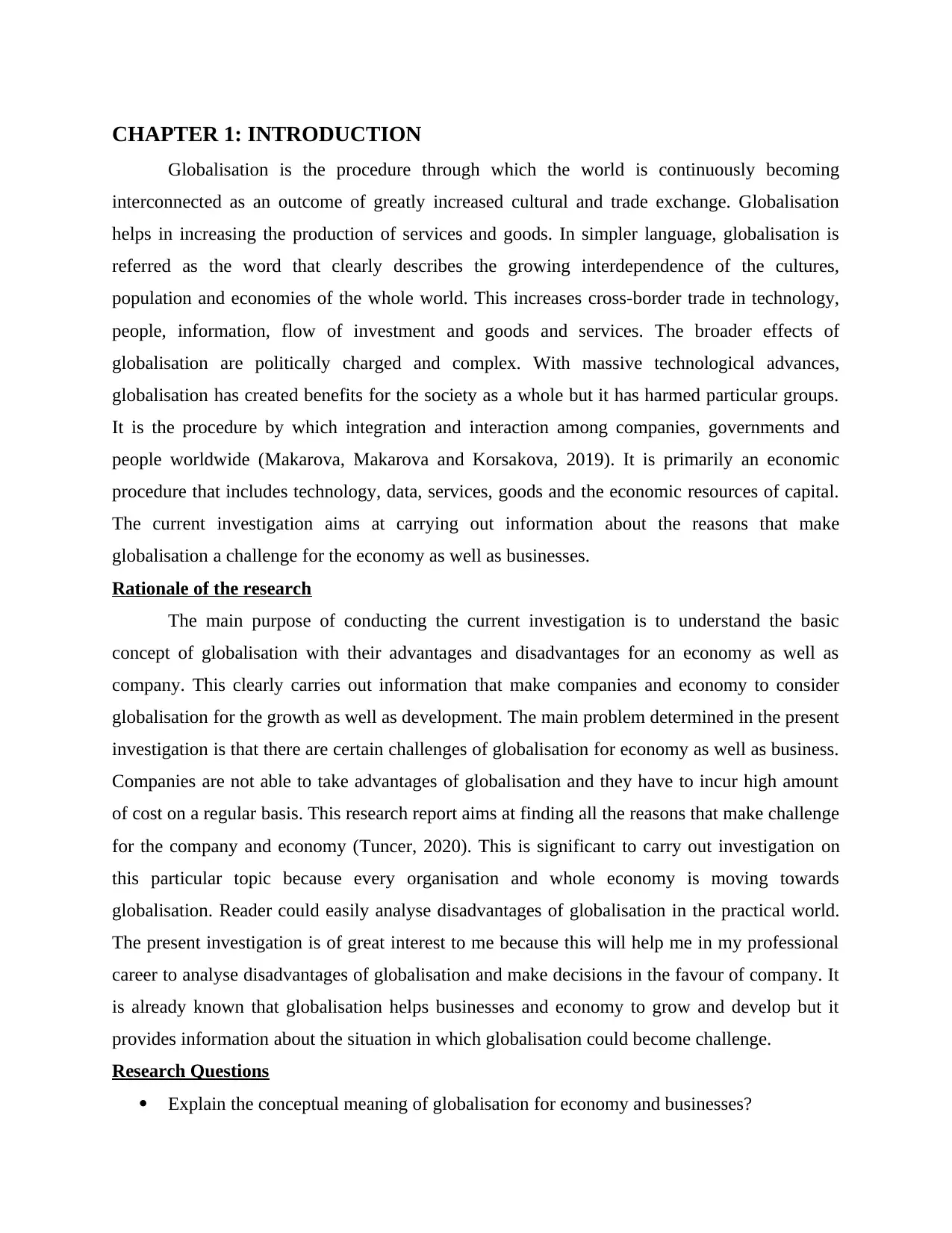
CHAPTER 1: INTRODUCTION
Globalisation is the procedure through which the world is continuously becoming
interconnected as an outcome of greatly increased cultural and trade exchange. Globalisation
helps in increasing the production of services and goods. In simpler language, globalisation is
referred as the word that clearly describes the growing interdependence of the cultures,
population and economies of the whole world. This increases cross-border trade in technology,
people, information, flow of investment and goods and services. The broader effects of
globalisation are politically charged and complex. With massive technological advances,
globalisation has created benefits for the society as a whole but it has harmed particular groups.
It is the procedure by which integration and interaction among companies, governments and
people worldwide (Makarova, Makarova and Korsakova, 2019). It is primarily an economic
procedure that includes technology, data, services, goods and the economic resources of capital.
The current investigation aims at carrying out information about the reasons that make
globalisation a challenge for the economy as well as businesses.
Rationale of the research
The main purpose of conducting the current investigation is to understand the basic
concept of globalisation with their advantages and disadvantages for an economy as well as
company. This clearly carries out information that make companies and economy to consider
globalisation for the growth as well as development. The main problem determined in the present
investigation is that there are certain challenges of globalisation for economy as well as business.
Companies are not able to take advantages of globalisation and they have to incur high amount
of cost on a regular basis. This research report aims at finding all the reasons that make challenge
for the company and economy (Tuncer, 2020). This is significant to carry out investigation on
this particular topic because every organisation and whole economy is moving towards
globalisation. Reader could easily analyse disadvantages of globalisation in the practical world.
The present investigation is of great interest to me because this will help me in my professional
career to analyse disadvantages of globalisation and make decisions in the favour of company. It
is already known that globalisation helps businesses and economy to grow and develop but it
provides information about the situation in which globalisation could become challenge.
Research Questions
Explain the conceptual meaning of globalisation for economy and businesses?
Globalisation is the procedure through which the world is continuously becoming
interconnected as an outcome of greatly increased cultural and trade exchange. Globalisation
helps in increasing the production of services and goods. In simpler language, globalisation is
referred as the word that clearly describes the growing interdependence of the cultures,
population and economies of the whole world. This increases cross-border trade in technology,
people, information, flow of investment and goods and services. The broader effects of
globalisation are politically charged and complex. With massive technological advances,
globalisation has created benefits for the society as a whole but it has harmed particular groups.
It is the procedure by which integration and interaction among companies, governments and
people worldwide (Makarova, Makarova and Korsakova, 2019). It is primarily an economic
procedure that includes technology, data, services, goods and the economic resources of capital.
The current investigation aims at carrying out information about the reasons that make
globalisation a challenge for the economy as well as businesses.
Rationale of the research
The main purpose of conducting the current investigation is to understand the basic
concept of globalisation with their advantages and disadvantages for an economy as well as
company. This clearly carries out information that make companies and economy to consider
globalisation for the growth as well as development. The main problem determined in the present
investigation is that there are certain challenges of globalisation for economy as well as business.
Companies are not able to take advantages of globalisation and they have to incur high amount
of cost on a regular basis. This research report aims at finding all the reasons that make challenge
for the company and economy (Tuncer, 2020). This is significant to carry out investigation on
this particular topic because every organisation and whole economy is moving towards
globalisation. Reader could easily analyse disadvantages of globalisation in the practical world.
The present investigation is of great interest to me because this will help me in my professional
career to analyse disadvantages of globalisation and make decisions in the favour of company. It
is already known that globalisation helps businesses and economy to grow and develop but it
provides information about the situation in which globalisation could become challenge.
Research Questions
Explain the conceptual meaning of globalisation for economy and businesses?
⊘ This is a preview!⊘
Do you want full access?
Subscribe today to unlock all pages.

Trusted by 1+ million students worldwide
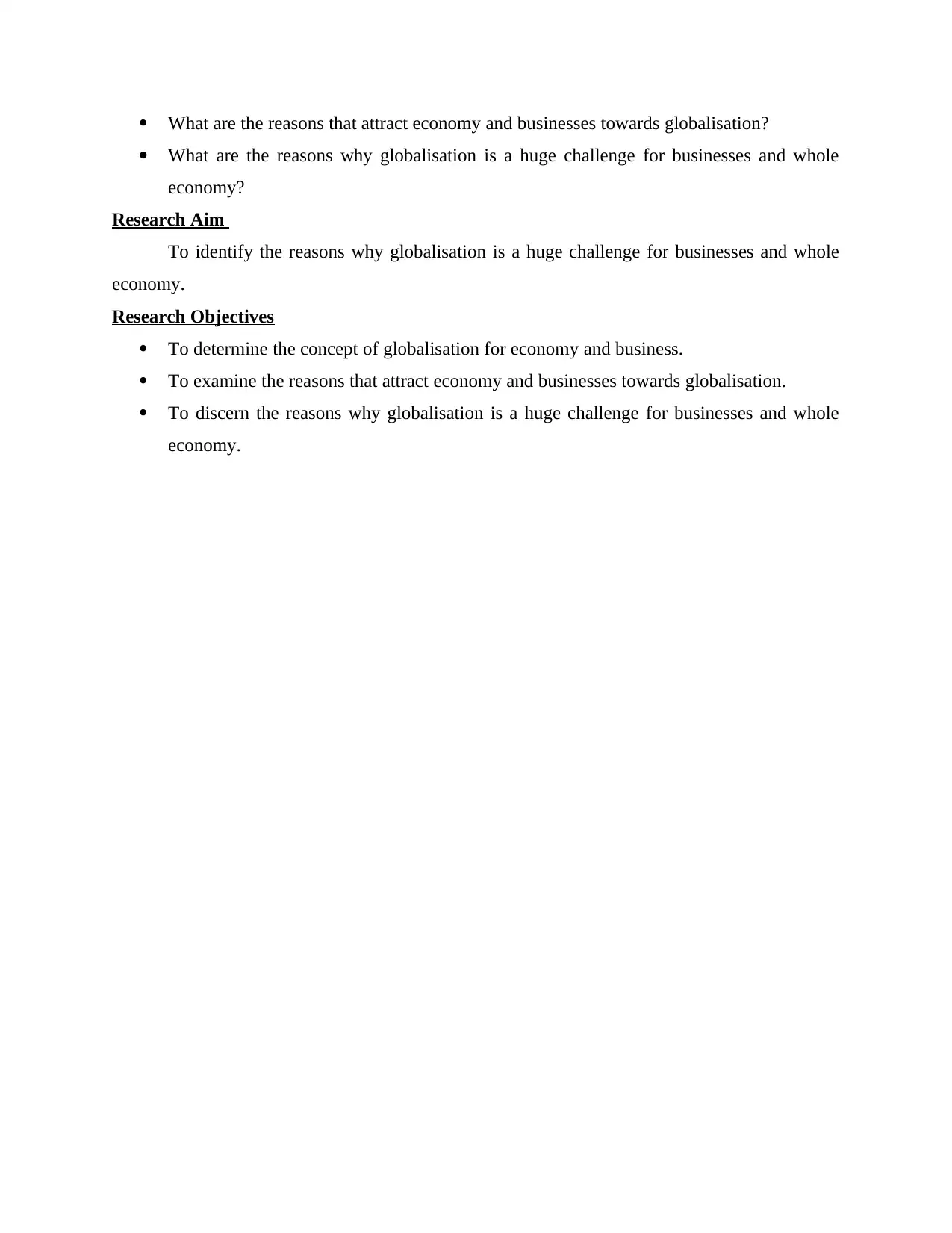
What are the reasons that attract economy and businesses towards globalisation?
What are the reasons why globalisation is a huge challenge for businesses and whole
economy?
Research Aim
To identify the reasons why globalisation is a huge challenge for businesses and whole
economy.
Research Objectives
To determine the concept of globalisation for economy and business.
To examine the reasons that attract economy and businesses towards globalisation.
To discern the reasons why globalisation is a huge challenge for businesses and whole
economy.
What are the reasons why globalisation is a huge challenge for businesses and whole
economy?
Research Aim
To identify the reasons why globalisation is a huge challenge for businesses and whole
economy.
Research Objectives
To determine the concept of globalisation for economy and business.
To examine the reasons that attract economy and businesses towards globalisation.
To discern the reasons why globalisation is a huge challenge for businesses and whole
economy.
Paraphrase This Document
Need a fresh take? Get an instant paraphrase of this document with our AI Paraphraser
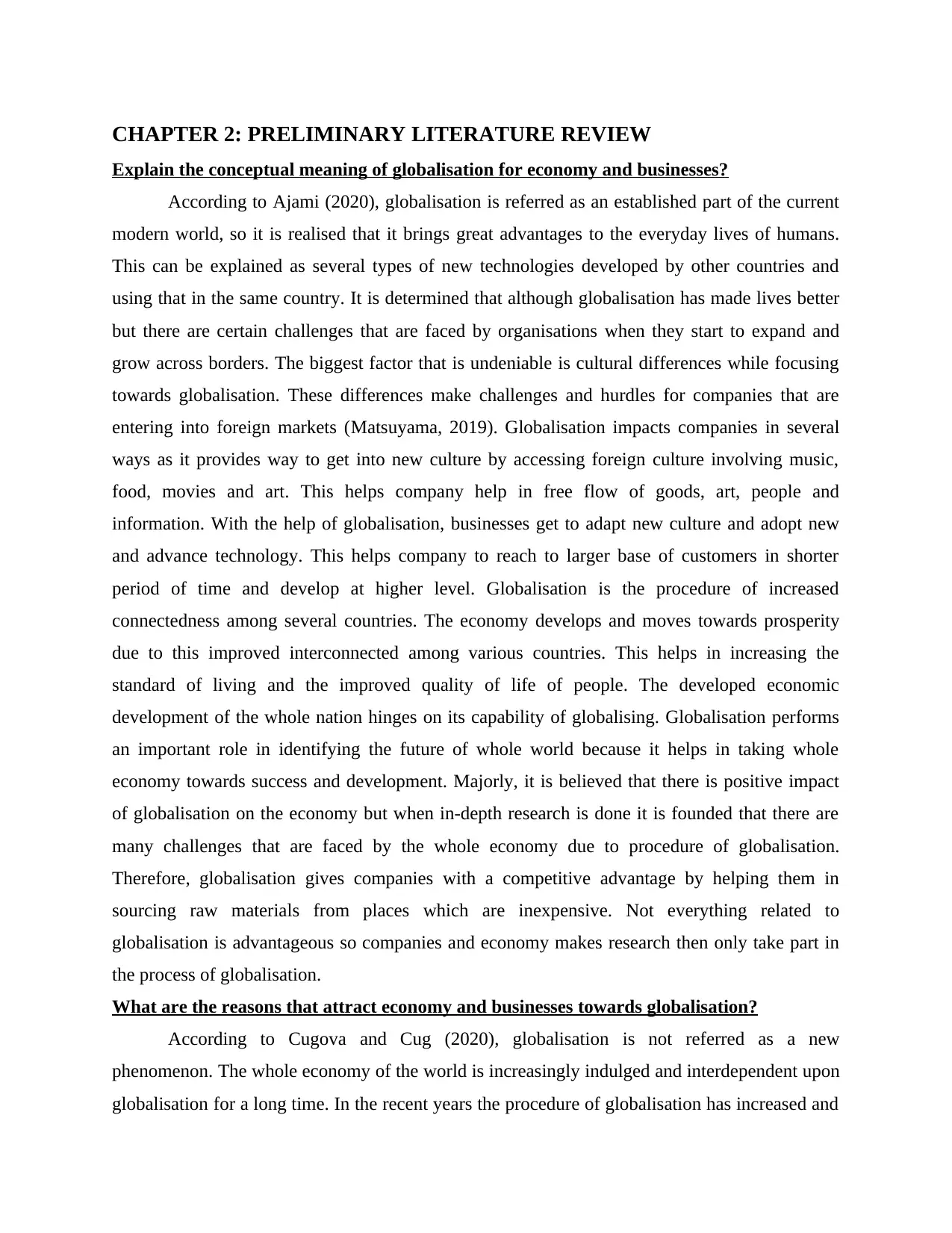
CHAPTER 2: PRELIMINARY LITERATURE REVIEW
Explain the conceptual meaning of globalisation for economy and businesses?
According to Ajami (2020), globalisation is referred as an established part of the current
modern world, so it is realised that it brings great advantages to the everyday lives of humans.
This can be explained as several types of new technologies developed by other countries and
using that in the same country. It is determined that although globalisation has made lives better
but there are certain challenges that are faced by organisations when they start to expand and
grow across borders. The biggest factor that is undeniable is cultural differences while focusing
towards globalisation. These differences make challenges and hurdles for companies that are
entering into foreign markets (Matsuyama, 2019). Globalisation impacts companies in several
ways as it provides way to get into new culture by accessing foreign culture involving music,
food, movies and art. This helps company help in free flow of goods, art, people and
information. With the help of globalisation, businesses get to adapt new culture and adopt new
and advance technology. This helps company to reach to larger base of customers in shorter
period of time and develop at higher level. Globalisation is the procedure of increased
connectedness among several countries. The economy develops and moves towards prosperity
due to this improved interconnected among various countries. This helps in increasing the
standard of living and the improved quality of life of people. The developed economic
development of the whole nation hinges on its capability of globalising. Globalisation performs
an important role in identifying the future of whole world because it helps in taking whole
economy towards success and development. Majorly, it is believed that there is positive impact
of globalisation on the economy but when in-depth research is done it is founded that there are
many challenges that are faced by the whole economy due to procedure of globalisation.
Therefore, globalisation gives companies with a competitive advantage by helping them in
sourcing raw materials from places which are inexpensive. Not everything related to
globalisation is advantageous so companies and economy makes research then only take part in
the process of globalisation.
What are the reasons that attract economy and businesses towards globalisation?
According to Cugova and Cug (2020), globalisation is not referred as a new
phenomenon. The whole economy of the world is increasingly indulged and interdependent upon
globalisation for a long time. In the recent years the procedure of globalisation has increased and
Explain the conceptual meaning of globalisation for economy and businesses?
According to Ajami (2020), globalisation is referred as an established part of the current
modern world, so it is realised that it brings great advantages to the everyday lives of humans.
This can be explained as several types of new technologies developed by other countries and
using that in the same country. It is determined that although globalisation has made lives better
but there are certain challenges that are faced by organisations when they start to expand and
grow across borders. The biggest factor that is undeniable is cultural differences while focusing
towards globalisation. These differences make challenges and hurdles for companies that are
entering into foreign markets (Matsuyama, 2019). Globalisation impacts companies in several
ways as it provides way to get into new culture by accessing foreign culture involving music,
food, movies and art. This helps company help in free flow of goods, art, people and
information. With the help of globalisation, businesses get to adapt new culture and adopt new
and advance technology. This helps company to reach to larger base of customers in shorter
period of time and develop at higher level. Globalisation is the procedure of increased
connectedness among several countries. The economy develops and moves towards prosperity
due to this improved interconnected among various countries. This helps in increasing the
standard of living and the improved quality of life of people. The developed economic
development of the whole nation hinges on its capability of globalising. Globalisation performs
an important role in identifying the future of whole world because it helps in taking whole
economy towards success and development. Majorly, it is believed that there is positive impact
of globalisation on the economy but when in-depth research is done it is founded that there are
many challenges that are faced by the whole economy due to procedure of globalisation.
Therefore, globalisation gives companies with a competitive advantage by helping them in
sourcing raw materials from places which are inexpensive. Not everything related to
globalisation is advantageous so companies and economy makes research then only take part in
the process of globalisation.
What are the reasons that attract economy and businesses towards globalisation?
According to Cugova and Cug (2020), globalisation is not referred as a new
phenomenon. The whole economy of the world is increasingly indulged and interdependent upon
globalisation for a long time. In the recent years the procedure of globalisation has increased and
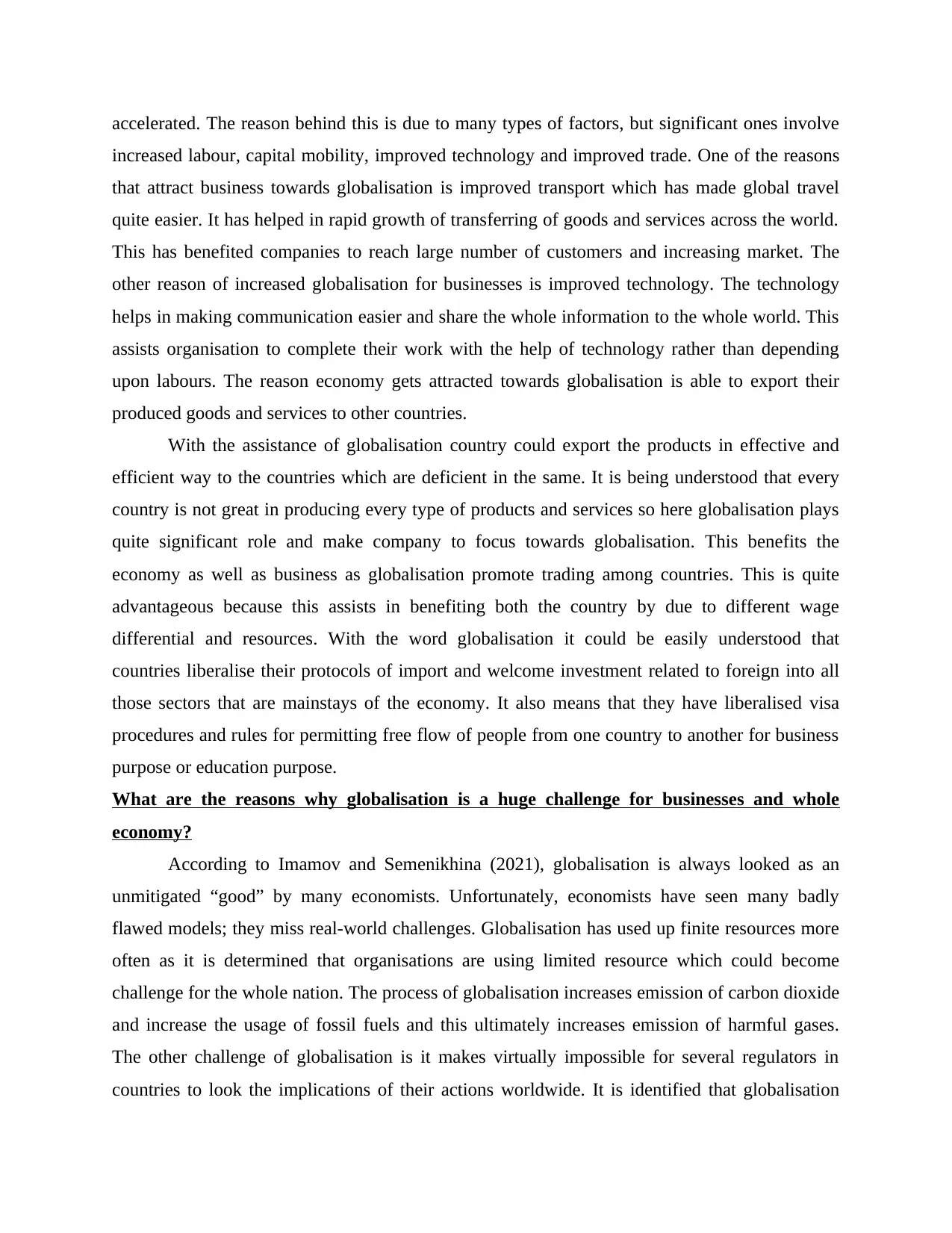
accelerated. The reason behind this is due to many types of factors, but significant ones involve
increased labour, capital mobility, improved technology and improved trade. One of the reasons
that attract business towards globalisation is improved transport which has made global travel
quite easier. It has helped in rapid growth of transferring of goods and services across the world.
This has benefited companies to reach large number of customers and increasing market. The
other reason of increased globalisation for businesses is improved technology. The technology
helps in making communication easier and share the whole information to the whole world. This
assists organisation to complete their work with the help of technology rather than depending
upon labours. The reason economy gets attracted towards globalisation is able to export their
produced goods and services to other countries.
With the assistance of globalisation country could export the products in effective and
efficient way to the countries which are deficient in the same. It is being understood that every
country is not great in producing every type of products and services so here globalisation plays
quite significant role and make company to focus towards globalisation. This benefits the
economy as well as business as globalisation promote trading among countries. This is quite
advantageous because this assists in benefiting both the country by due to different wage
differential and resources. With the word globalisation it could be easily understood that
countries liberalise their protocols of import and welcome investment related to foreign into all
those sectors that are mainstays of the economy. It also means that they have liberalised visa
procedures and rules for permitting free flow of people from one country to another for business
purpose or education purpose.
What are the reasons why globalisation is a huge challenge for businesses and whole
economy?
According to Imamov and Semenikhina (2021), globalisation is always looked as an
unmitigated “good” by many economists. Unfortunately, economists have seen many badly
flawed models; they miss real-world challenges. Globalisation has used up finite resources more
often as it is determined that organisations are using limited resource which could become
challenge for the whole nation. The process of globalisation increases emission of carbon dioxide
and increase the usage of fossil fuels and this ultimately increases emission of harmful gases.
The other challenge of globalisation is it makes virtually impossible for several regulators in
countries to look the implications of their actions worldwide. It is identified that globalisation
increased labour, capital mobility, improved technology and improved trade. One of the reasons
that attract business towards globalisation is improved transport which has made global travel
quite easier. It has helped in rapid growth of transferring of goods and services across the world.
This has benefited companies to reach large number of customers and increasing market. The
other reason of increased globalisation for businesses is improved technology. The technology
helps in making communication easier and share the whole information to the whole world. This
assists organisation to complete their work with the help of technology rather than depending
upon labours. The reason economy gets attracted towards globalisation is able to export their
produced goods and services to other countries.
With the assistance of globalisation country could export the products in effective and
efficient way to the countries which are deficient in the same. It is being understood that every
country is not great in producing every type of products and services so here globalisation plays
quite significant role and make company to focus towards globalisation. This benefits the
economy as well as business as globalisation promote trading among countries. This is quite
advantageous because this assists in benefiting both the country by due to different wage
differential and resources. With the word globalisation it could be easily understood that
countries liberalise their protocols of import and welcome investment related to foreign into all
those sectors that are mainstays of the economy. It also means that they have liberalised visa
procedures and rules for permitting free flow of people from one country to another for business
purpose or education purpose.
What are the reasons why globalisation is a huge challenge for businesses and whole
economy?
According to Imamov and Semenikhina (2021), globalisation is always looked as an
unmitigated “good” by many economists. Unfortunately, economists have seen many badly
flawed models; they miss real-world challenges. Globalisation has used up finite resources more
often as it is determined that organisations are using limited resource which could become
challenge for the whole nation. The process of globalisation increases emission of carbon dioxide
and increase the usage of fossil fuels and this ultimately increases emission of harmful gases.
The other challenge of globalisation is it makes virtually impossible for several regulators in
countries to look the implications of their actions worldwide. It is identified that globalisation
⊘ This is a preview!⊘
Do you want full access?
Subscribe today to unlock all pages.

Trusted by 1+ million students worldwide

increases job opportunities but companies expanding from one country to another does not give
high pay to the labours as well as employees. So, this clearly shows that employees and labours
are over exploited in the country due to the procedure of globalisation. Hence, it is identified that
there are many challenges that are faced by companies as well as whole economy due to the
procedure of globalisation.
high pay to the labours as well as employees. So, this clearly shows that employees and labours
are over exploited in the country due to the procedure of globalisation. Hence, it is identified that
there are many challenges that are faced by companies as well as whole economy due to the
procedure of globalisation.
Paraphrase This Document
Need a fresh take? Get an instant paraphrase of this document with our AI Paraphraser
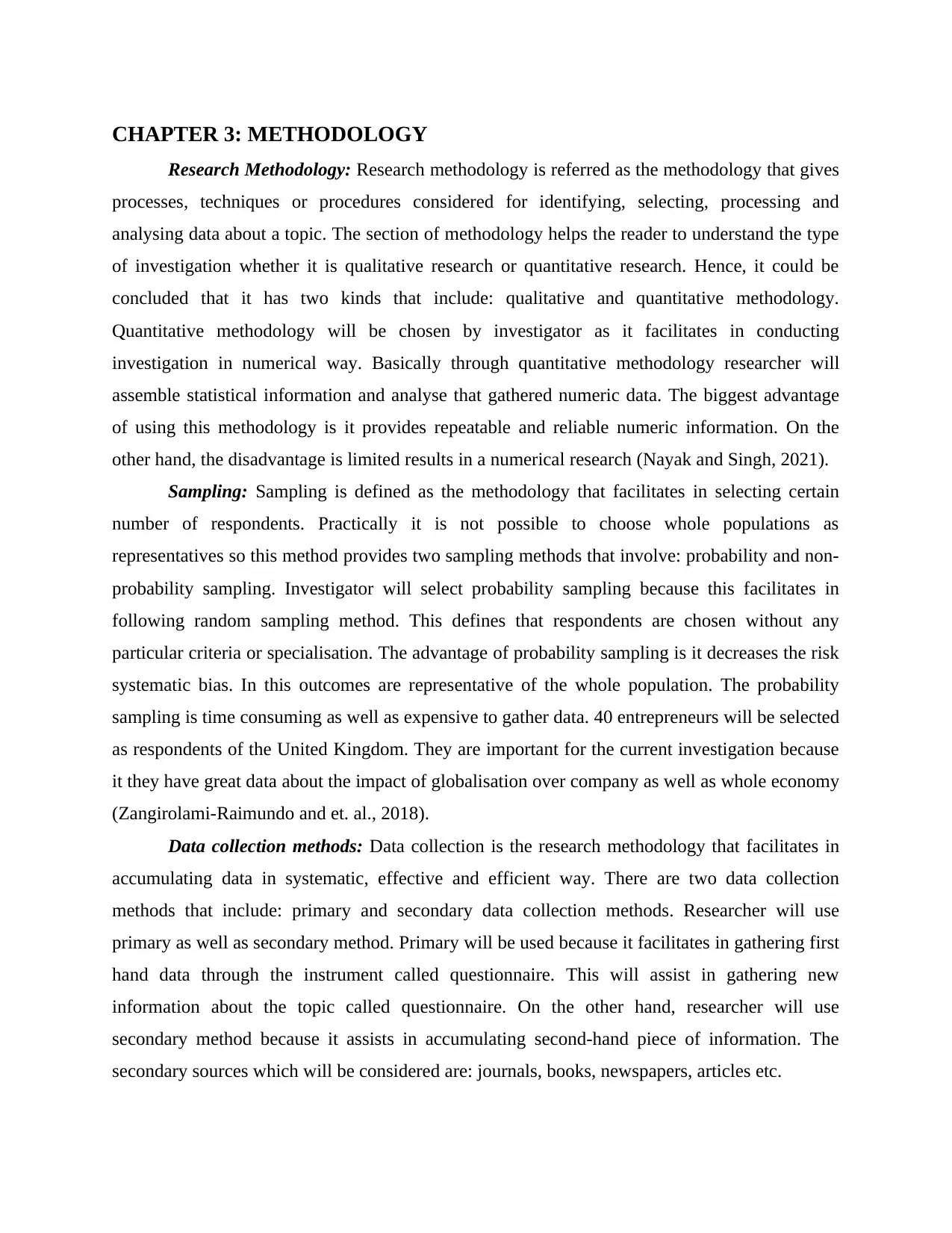
CHAPTER 3: METHODOLOGY
Research Methodology: Research methodology is referred as the methodology that gives
processes, techniques or procedures considered for identifying, selecting, processing and
analysing data about a topic. The section of methodology helps the reader to understand the type
of investigation whether it is qualitative research or quantitative research. Hence, it could be
concluded that it has two kinds that include: qualitative and quantitative methodology.
Quantitative methodology will be chosen by investigator as it facilitates in conducting
investigation in numerical way. Basically through quantitative methodology researcher will
assemble statistical information and analyse that gathered numeric data. The biggest advantage
of using this methodology is it provides repeatable and reliable numeric information. On the
other hand, the disadvantage is limited results in a numerical research (Nayak and Singh, 2021).
Sampling: Sampling is defined as the methodology that facilitates in selecting certain
number of respondents. Practically it is not possible to choose whole populations as
representatives so this method provides two sampling methods that involve: probability and non-
probability sampling. Investigator will select probability sampling because this facilitates in
following random sampling method. This defines that respondents are chosen without any
particular criteria or specialisation. The advantage of probability sampling is it decreases the risk
systematic bias. In this outcomes are representative of the whole population. The probability
sampling is time consuming as well as expensive to gather data. 40 entrepreneurs will be selected
as respondents of the United Kingdom. They are important for the current investigation because
it they have great data about the impact of globalisation over company as well as whole economy
(Zangirolami-Raimundo and et. al., 2018).
Data collection methods: Data collection is the research methodology that facilitates in
accumulating data in systematic, effective and efficient way. There are two data collection
methods that include: primary and secondary data collection methods. Researcher will use
primary as well as secondary method. Primary will be used because it facilitates in gathering first
hand data through the instrument called questionnaire. This will assist in gathering new
information about the topic called questionnaire. On the other hand, researcher will use
secondary method because it assists in accumulating second-hand piece of information. The
secondary sources which will be considered are: journals, books, newspapers, articles etc.
Research Methodology: Research methodology is referred as the methodology that gives
processes, techniques or procedures considered for identifying, selecting, processing and
analysing data about a topic. The section of methodology helps the reader to understand the type
of investigation whether it is qualitative research or quantitative research. Hence, it could be
concluded that it has two kinds that include: qualitative and quantitative methodology.
Quantitative methodology will be chosen by investigator as it facilitates in conducting
investigation in numerical way. Basically through quantitative methodology researcher will
assemble statistical information and analyse that gathered numeric data. The biggest advantage
of using this methodology is it provides repeatable and reliable numeric information. On the
other hand, the disadvantage is limited results in a numerical research (Nayak and Singh, 2021).
Sampling: Sampling is defined as the methodology that facilitates in selecting certain
number of respondents. Practically it is not possible to choose whole populations as
representatives so this method provides two sampling methods that involve: probability and non-
probability sampling. Investigator will select probability sampling because this facilitates in
following random sampling method. This defines that respondents are chosen without any
particular criteria or specialisation. The advantage of probability sampling is it decreases the risk
systematic bias. In this outcomes are representative of the whole population. The probability
sampling is time consuming as well as expensive to gather data. 40 entrepreneurs will be selected
as respondents of the United Kingdom. They are important for the current investigation because
it they have great data about the impact of globalisation over company as well as whole economy
(Zangirolami-Raimundo and et. al., 2018).
Data collection methods: Data collection is the research methodology that facilitates in
accumulating data in systematic, effective and efficient way. There are two data collection
methods that include: primary and secondary data collection methods. Researcher will use
primary as well as secondary method. Primary will be used because it facilitates in gathering first
hand data through the instrument called questionnaire. This will assist in gathering new
information about the topic called questionnaire. On the other hand, researcher will use
secondary method because it assists in accumulating second-hand piece of information. The
secondary sources which will be considered are: journals, books, newspapers, articles etc.
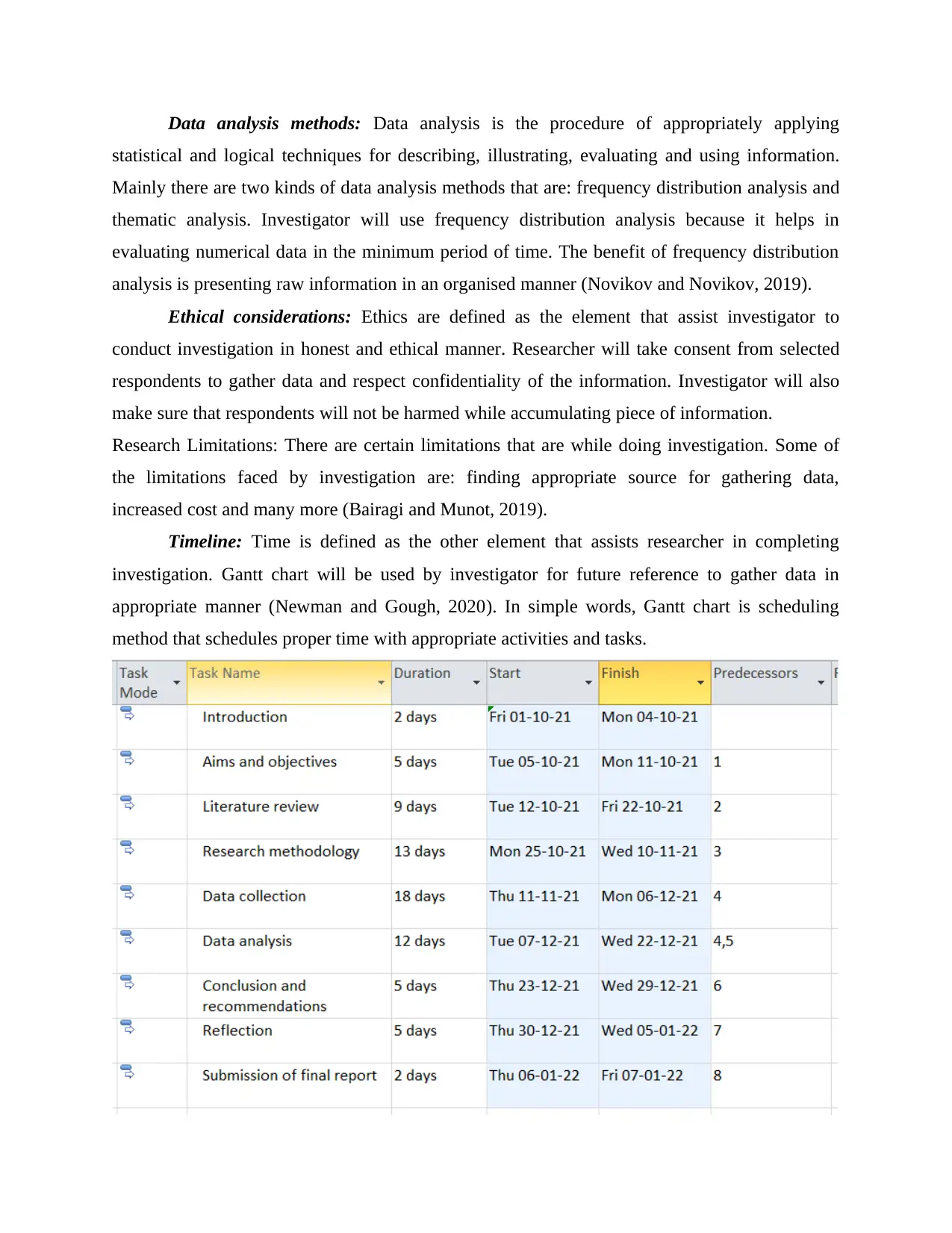
Data analysis methods: Data analysis is the procedure of appropriately applying
statistical and logical techniques for describing, illustrating, evaluating and using information.
Mainly there are two kinds of data analysis methods that are: frequency distribution analysis and
thematic analysis. Investigator will use frequency distribution analysis because it helps in
evaluating numerical data in the minimum period of time. The benefit of frequency distribution
analysis is presenting raw information in an organised manner (Novikov and Novikov, 2019).
Ethical considerations: Ethics are defined as the element that assist investigator to
conduct investigation in honest and ethical manner. Researcher will take consent from selected
respondents to gather data and respect confidentiality of the information. Investigator will also
make sure that respondents will not be harmed while accumulating piece of information.
Research Limitations: There are certain limitations that are while doing investigation. Some of
the limitations faced by investigation are: finding appropriate source for gathering data,
increased cost and many more (Bairagi and Munot, 2019).
Timeline: Time is defined as the other element that assists researcher in completing
investigation. Gantt chart will be used by investigator for future reference to gather data in
appropriate manner (Newman and Gough, 2020). In simple words, Gantt chart is scheduling
method that schedules proper time with appropriate activities and tasks.
statistical and logical techniques for describing, illustrating, evaluating and using information.
Mainly there are two kinds of data analysis methods that are: frequency distribution analysis and
thematic analysis. Investigator will use frequency distribution analysis because it helps in
evaluating numerical data in the minimum period of time. The benefit of frequency distribution
analysis is presenting raw information in an organised manner (Novikov and Novikov, 2019).
Ethical considerations: Ethics are defined as the element that assist investigator to
conduct investigation in honest and ethical manner. Researcher will take consent from selected
respondents to gather data and respect confidentiality of the information. Investigator will also
make sure that respondents will not be harmed while accumulating piece of information.
Research Limitations: There are certain limitations that are while doing investigation. Some of
the limitations faced by investigation are: finding appropriate source for gathering data,
increased cost and many more (Bairagi and Munot, 2019).
Timeline: Time is defined as the other element that assists researcher in completing
investigation. Gantt chart will be used by investigator for future reference to gather data in
appropriate manner (Newman and Gough, 2020). In simple words, Gantt chart is scheduling
method that schedules proper time with appropriate activities and tasks.
⊘ This is a preview!⊘
Do you want full access?
Subscribe today to unlock all pages.

Trusted by 1+ million students worldwide
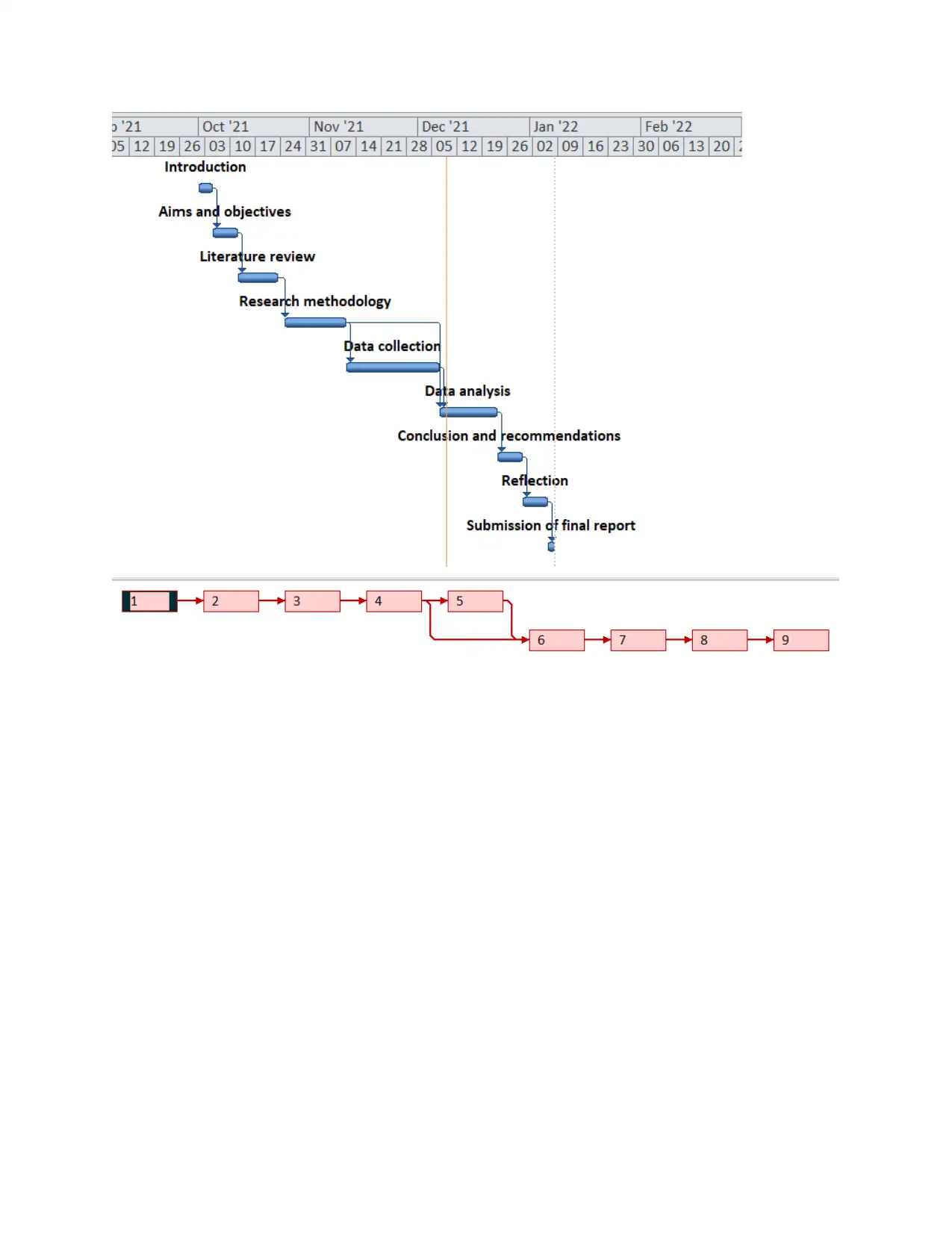
Paraphrase This Document
Need a fresh take? Get an instant paraphrase of this document with our AI Paraphraser
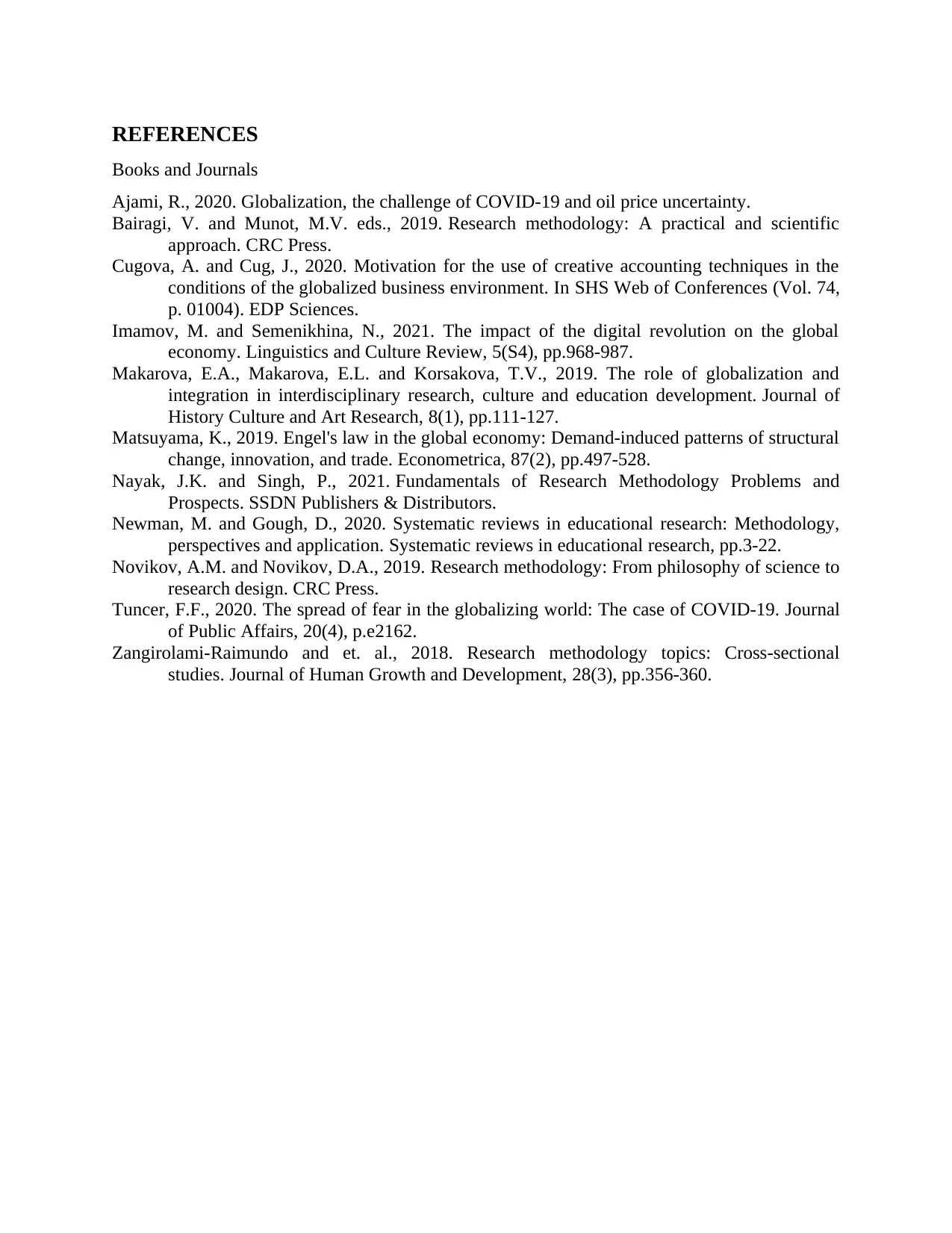
REFERENCES
Books and Journals
Ajami, R., 2020. Globalization, the challenge of COVID-19 and oil price uncertainty.
Bairagi, V. and Munot, M.V. eds., 2019. Research methodology: A practical and scientific
approach. CRC Press.
Cugova, A. and Cug, J., 2020. Motivation for the use of creative accounting techniques in the
conditions of the globalized business environment. In SHS Web of Conferences (Vol. 74,
p. 01004). EDP Sciences.
Imamov, M. and Semenikhina, N., 2021. The impact of the digital revolution on the global
economy. Linguistics and Culture Review, 5(S4), pp.968-987.
Makarova, E.A., Makarova, E.L. and Korsakova, T.V., 2019. The role of globalization and
integration in interdisciplinary research, culture and education development. Journal of
History Culture and Art Research, 8(1), pp.111-127.
Matsuyama, K., 2019. Engel's law in the global economy: Demand‐induced patterns of structural
change, innovation, and trade. Econometrica, 87(2), pp.497-528.
Nayak, J.K. and Singh, P., 2021. Fundamentals of Research Methodology Problems and
Prospects. SSDN Publishers & Distributors.
Newman, M. and Gough, D., 2020. Systematic reviews in educational research: Methodology,
perspectives and application. Systematic reviews in educational research, pp.3-22.
Novikov, A.M. and Novikov, D.A., 2019. Research methodology: From philosophy of science to
research design. CRC Press.
Tuncer, F.F., 2020. The spread of fear in the globalizing world: The case of COVID‐19. Journal
of Public Affairs, 20(4), p.e2162.
Zangirolami-Raimundo and et. al., 2018. Research methodology topics: Cross-sectional
studies. Journal of Human Growth and Development, 28(3), pp.356-360.
Books and Journals
Ajami, R., 2020. Globalization, the challenge of COVID-19 and oil price uncertainty.
Bairagi, V. and Munot, M.V. eds., 2019. Research methodology: A practical and scientific
approach. CRC Press.
Cugova, A. and Cug, J., 2020. Motivation for the use of creative accounting techniques in the
conditions of the globalized business environment. In SHS Web of Conferences (Vol. 74,
p. 01004). EDP Sciences.
Imamov, M. and Semenikhina, N., 2021. The impact of the digital revolution on the global
economy. Linguistics and Culture Review, 5(S4), pp.968-987.
Makarova, E.A., Makarova, E.L. and Korsakova, T.V., 2019. The role of globalization and
integration in interdisciplinary research, culture and education development. Journal of
History Culture and Art Research, 8(1), pp.111-127.
Matsuyama, K., 2019. Engel's law in the global economy: Demand‐induced patterns of structural
change, innovation, and trade. Econometrica, 87(2), pp.497-528.
Nayak, J.K. and Singh, P., 2021. Fundamentals of Research Methodology Problems and
Prospects. SSDN Publishers & Distributors.
Newman, M. and Gough, D., 2020. Systematic reviews in educational research: Methodology,
perspectives and application. Systematic reviews in educational research, pp.3-22.
Novikov, A.M. and Novikov, D.A., 2019. Research methodology: From philosophy of science to
research design. CRC Press.
Tuncer, F.F., 2020. The spread of fear in the globalizing world: The case of COVID‐19. Journal
of Public Affairs, 20(4), p.e2162.
Zangirolami-Raimundo and et. al., 2018. Research methodology topics: Cross-sectional
studies. Journal of Human Growth and Development, 28(3), pp.356-360.
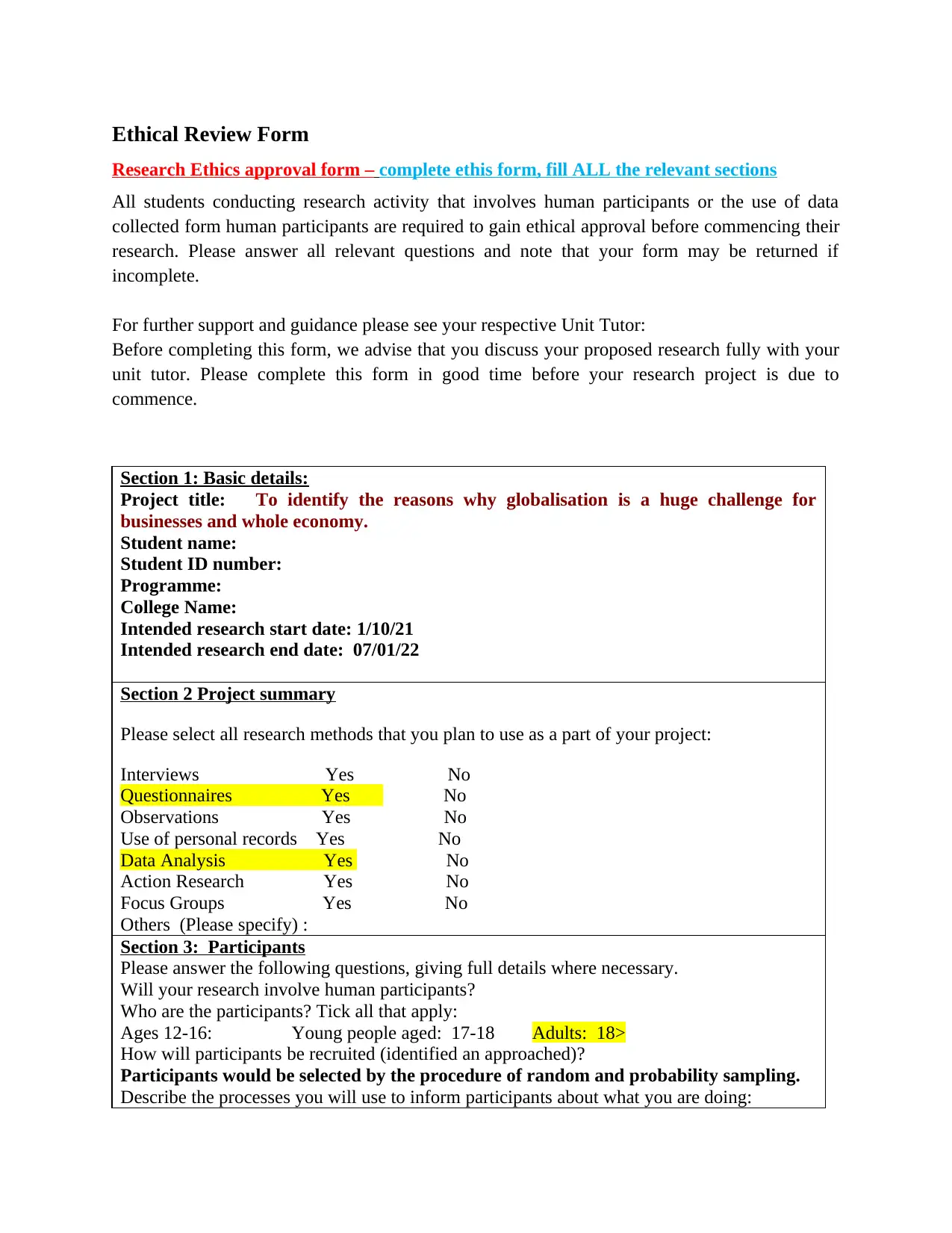
Ethical Review Form
Research Ethics approval form – complete ethis form, fill ALL the relevant sections
All students conducting research activity that involves human participants or the use of data
collected form human participants are required to gain ethical approval before commencing their
research. Please answer all relevant questions and note that your form may be returned if
incomplete.
For further support and guidance please see your respective Unit Tutor:
Before completing this form, we advise that you discuss your proposed research fully with your
unit tutor. Please complete this form in good time before your research project is due to
commence.
Section 1: Basic details:
Project title: To identify the reasons why globalisation is a huge challenge for
businesses and whole economy.
Student name:
Student ID number:
Programme:
College Name:
Intended research start date: 1/10/21
Intended research end date: 07/01/22
Section 2 Project summary
Please select all research methods that you plan to use as a part of your project:
Interviews Yes No
Questionnaires Yes No
Observations Yes No
Use of personal records Yes No
Data Analysis Yes No
Action Research Yes No
Focus Groups Yes No
Others (Please specify) :
Section 3: Participants
Please answer the following questions, giving full details where necessary.
Will your research involve human participants?
Who are the participants? Tick all that apply:
Ages 12-16: Young people aged: 17-18 Adults: 18>
How will participants be recruited (identified an approached)?
Participants would be selected by the procedure of random and probability sampling.
Describe the processes you will use to inform participants about what you are doing:
Research Ethics approval form – complete ethis form, fill ALL the relevant sections
All students conducting research activity that involves human participants or the use of data
collected form human participants are required to gain ethical approval before commencing their
research. Please answer all relevant questions and note that your form may be returned if
incomplete.
For further support and guidance please see your respective Unit Tutor:
Before completing this form, we advise that you discuss your proposed research fully with your
unit tutor. Please complete this form in good time before your research project is due to
commence.
Section 1: Basic details:
Project title: To identify the reasons why globalisation is a huge challenge for
businesses and whole economy.
Student name:
Student ID number:
Programme:
College Name:
Intended research start date: 1/10/21
Intended research end date: 07/01/22
Section 2 Project summary
Please select all research methods that you plan to use as a part of your project:
Interviews Yes No
Questionnaires Yes No
Observations Yes No
Use of personal records Yes No
Data Analysis Yes No
Action Research Yes No
Focus Groups Yes No
Others (Please specify) :
Section 3: Participants
Please answer the following questions, giving full details where necessary.
Will your research involve human participants?
Who are the participants? Tick all that apply:
Ages 12-16: Young people aged: 17-18 Adults: 18>
How will participants be recruited (identified an approached)?
Participants would be selected by the procedure of random and probability sampling.
Describe the processes you will use to inform participants about what you are doing:
⊘ This is a preview!⊘
Do you want full access?
Subscribe today to unlock all pages.

Trusted by 1+ million students worldwide
1 out of 14
Related Documents
Your All-in-One AI-Powered Toolkit for Academic Success.
+13062052269
info@desklib.com
Available 24*7 on WhatsApp / Email
![[object Object]](/_next/static/media/star-bottom.7253800d.svg)
Unlock your academic potential
Copyright © 2020–2026 A2Z Services. All Rights Reserved. Developed and managed by ZUCOL.





